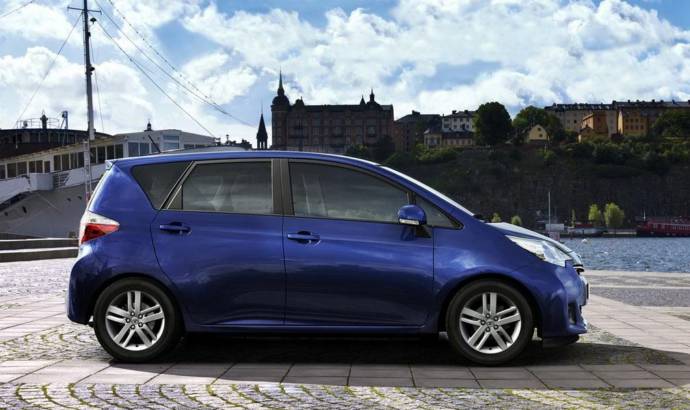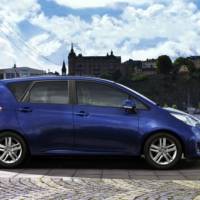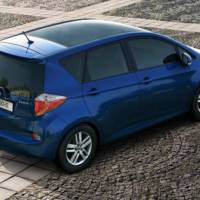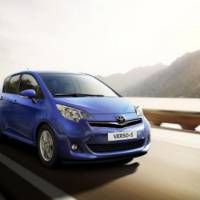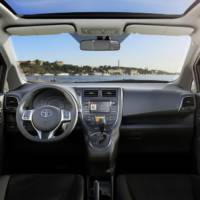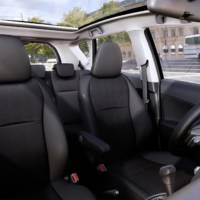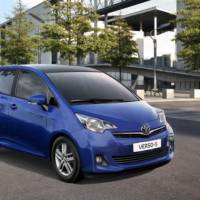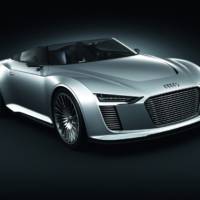The 2011 Toyota Verso S has just debuted in Paris, so we now have a full photo gallery and detailed information regarding the new mini MPV.
Expected to be launched on the market ext year, the 2011 Toyota Verso S will extract power from a 1.33-litre VVT-i petrol engine that is mated to a 6-speed manual gearbox, and which will develop 98bhp at 6,000rpm and peak torque of 126Nm at 4,000rpm.
With this engine the 2011 Toyota Verso S is targeting class leading efficiency, as it will return 54.3 mpg in a combined cycle, with CO2 emissions of 127 g/Km.
If fitted with the automaker’s Multidrive S, (Toyota’s continuously variable transmission), the 2011 Toyota Verso S will achieve even better figures, of 54.3 mpg, and CO2 levels of 120 grams per Km.
Other highlights regarding the 2011 Toyota Verso S include the touch screen multimedia interface at tine interior and the Navi-Box multimedia booster system while the car’s loading capacity is 1,388 litres.
The 2011 Toyota Verso S will get announced as the on sale date approaches.
Toyota press release :
KEY POINTS
* Toyota returns to the mini-MPV segment with Verso-S
* Public debut at the Paris motor show
* Less than four metres long, but with cabin and luggage space to rival a family hatchback
* One-touch flat-folding 60:40 rear seats
* Load space up to a maximum 1,388 litres
* Toyota Optimal Drive 1.33-litre Dual VVT-i petrol engine
* Touch screen multimedia interface – a Toyota first – for on-board audio, Bluetooth and rear parking monitor
* Navi-Box multimedia booster system to be introduced post-launch
* On sale February 2011
Introduction
Toyota will return to the mini-MPV (B-MPV) market in 2011 with the new Verso-S, its first contender in a segment it created itself in 1999 with the launch of Yaris Verso.
Verso-S will compete in part of the European new car market that has almost tripled in size since 2002, thanks to more motorists downsizing and seeking small cars with high levels of interior flexibility.
Design and packaging
Small, spacious and smart, the Toyota Verso-S showcases efficient space management. Although it measures less than four metres long – it is the shortest model in the European B-segment – clever packaging delivers remarkable room for both those on board and their luggage.
The exterior styling is characterised by short front and rear overhangs, sweeping coachwork lines and a (optional) large, panoramic sunroof. The cabin design focus is on excellent ergonomics and high levels of perceived quality. Soft touch materials are used on the two-tier dashboard and sculpted door panels. Crisp, brushed metal surrounds for the instrument cluster and centre console add further to the quality perception.
Within the 2,550mm wheelbase space has been maximised with features such as streamlined front seat and door and trim panel design, giving class-leading front passenger headroom, rear seat knee room and loadspace length and volume.
The hip points for front and rear seat occupants have been raised to gain good visibility and to make it easier to get in and out of the car. Driver comfort is increased with seat height adjustment, an arm rest and a gear lever placed close to the three-spoke steering wheel.
The 60:40 split rear seats have a centre arm rest and a one-touch fold-flat mechanism. Unlike any other competitor model in the mini-MPV segment, the seats can also be folded down from the boot, thanks to tilt-down levers provided on the loadspace sidewalls, within easy reach of the rear door.
The top-hinged tailgate is cut into the rear bumper, which means there is lip-free access to the loadspace. The floor incorporates a lightweight deck board which can be set at bumper level to give a flat load floor and 336-litre cargo volume, or can be lowered (a one-handed operation) to increase loadspace depth by 95mm and volume by an extra 57 litres.
The board can be removed altogether, bringing the spare wheel well into play and bringing cargo volume up to 430 litres. Fold the rear seats flat and the maximum available is 1,388 litres.
Elsewhere around the cabin there are bottle and cup holders, generously proportioned front door pockets and a versatile, three-level dashboard storage compartment.
Powertrains
Verso-S is available with the Toyota Optimal Drive 1.33-litre Dual VVT-i petrol engine. Matched to a six-speed manual transmission, it generates a maximum 98bhp at 6,000rpm and peak torque of 126Nm at 4,000rpm. Toyota targets a class-leading combined cycle fuel economy of 51.4mpg, with 127g/km CO2 emissions.
Multidrive S, Toyota’s continuously variable transmission is available as an option. It features a manual override seven-speed sequential mode which the driver can operate using paddle shifts mounted on the steering wheel, or the gear lever. In models equipped with this system Toyota targets 54.3mpg combined cycle fuel consumption and 120g/km CO2 emissions.
Touch Screen Multimedia Interface
Toyota marks a first in the mini-MPV segment by equipping Verso-S with a new 6.1-inch, full colour Touch Screen Multimedia Interface. This gives clear and easy access to controls for the radio, CD/MP3 player and Bluetooth. There is also a USB port for connecting portable music players, and the screen can display album cover artwork (with compatible music players) and present the real-time view from a rear parking camera.
At a later date, Toyota will introduce Navi-Box as an option, a booster system that allows pictures to be viewed and music to be sorted from a USB-connected source.
Navi-Box enhances satellite navigation functions, with speed camera warnings and motorway signage, and it gives access to Google-connected services, for example points of interest that can be downloaded from the internet and entered as destinations. Other applications include links to social networking services, fuel prices, news and weather reports.
Equipment features
Equipment grades for the UK market will be announced nearer the launch date. UK and European sales are scheduled to begin in February 2011.
Safety
Verso-S is equipped to high standards of active, passive and pedestrian impact safety with all versions equipped with seven airbags, including a driver’s knee airbag. All seats are fitted with three-point seatbelts with emergency locking retractors; those on the front seats have pretensioners and force limiters.
The active safety systems include ABS with Electronic Brakeforce Distribution (EBD), Brake Assist (BA), Traction Control (TRC) and Vehicle Stability Control (VSC).
Source: Toyota
